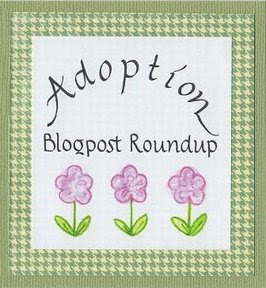When I was a kid, we learned dozens of little Sunday school ditties that ran through our heads wherever we went, keeping us on the proverbial straight-and-narrow. One of the most popular went like this:
Oh, be careful little mouth what you say (repeat)
For the Father up above
Is looking down in love.
So, be careful little mouth what you say!
The song popped into my head again yesterday at the park, when the kids and I took their “Grammy” for a walk around the park while Dad and “Poppi” were gamely battling the wind and drizzle in an attempt to light the grill under the picnic pavilion.
In between nature discoveries (slow-moving bugs and fast-swimming mallards) we made up silly little songs – “Songs to Skip By,” if you will. To the tune of “Camptown Races,” Mammy sang, “Little Sarah, she’s so sweet, doo dah, doo dah…”
Before I could engage my brain, I offered up the next line. “Though she’s got such stinky feet, O doo dah day!” I looked back, expecting the entire group to chuckle (including Sarah, who just the night before stuck her toes in my face for a tickle, and hooted as she always did when I grimaced at her supposedly smelly soles).
Today, however, it was no laughing matter. The effect was immediate: My four-year-old daughter stopped skipping and ducked her head, her little shoulders hunched. I had embarrassed her – in front of Grammy, no less. “I do NOT have stinky feet!” she protested under her breath. All eyes flew to my face.
Wishing to “Rewind”There are times in every parent’s life when we wish for nothing so much as a rewind button on our lips. Quickly I knelt in front of Sarah and wrapped my arms around her wooden frame. “Of course you don’t, Sweetheart. I’m so sorry I hurt your feelings. Mommy shouldn’t have said that – and I won’t say it ever again. Will you forgive me?” After a moment she nodded, but she was quiet the rest of the walk, except to remind her grandmother, “Mommy said I have stinky feet, but I don’t really.”
That night I tossed and turned in bed, realizing with anguish that I had broken a mother’s promise. As a child I had frequently been on the receiving end of thoughtless and hurtful remarks that had cut to the core. Over the years my emotional armor became a permanent fixture, protecting me even from those who loved me. Thank God for Craig, whose gentle demeanor made me feel safe enough to let down my guard. (To this day we have the shortest fights on record: On those rare occasions a harsh or impatient word escapes him, my eyes tear up and he moves heaven and earth to make it stop!)
I promised myself that if I did nothing else for my children, I would teach them that their feelings were safe with me. I understood how much words could hurt, and they had already been subjected to horrific abuse and neglect in their early years. I was determined that they would never have reason to question whether they were loved and appreciated. They could be able to trust their mother not to expose them publicly for private shortcomings. “Praise in public, correct in private” was my motto. The incident at the park reminded me just how careful I needed to be if I were going to keep that promise.
Extended Protection WarrantedFor many foster families, there are other important reasons to protect our children from the idle curiosity of others – even other family members. Extended family may object to the prospect having to include in the family circle a messy, noisy, energy-draining urchin or two with whom they share no biological connection. Furthermore, the behavior one can expect from traumatized children – verbal or physical outbursts, “prickly” responses to gestures of kindness and affection, bad manners and hyperactive tendencies – can be off-putting for those unaccustomed to dealing with such children.
One family I know saw their in-laws just twice the first year after their foster children arrived, even though the grandparents lived barely thirty minutes away. “We’re not used to having little children around,” they would excuse themselves. “We’re too old to keep up with them.” And yet, these were the same people who begged their daughter-in-law to keep their son’s teddy bear on their bed because they had read an article that it could increase the chances of conceiving a child.
My friend recognized the emotional impasse that was at stake here, and began “chatting up” her mother-in-law with the children’s progress, even dropping by unexpectedly and placing the youngest child, who was then less than a year old, in her grandmother’s arms. Gradually the ice began to thaw.
A year later, when the adoption went through, the grandparents began taking more interest in their new grandchildren. They had lost out on nearly two years of their adopted grandkid’s young lives. And the adoptive parents, who had struggled through that first year of foster care, had missed the benefit of having family nearby. And yet, there was nothing to be gained by mourning or harboring resentments about the past – and much to be gained by focusing on the present.
In this case, a little emotional armor – which enabled the adoptive mother to persevere in cultivating a relationship between her children and her standoffish mother-in-law – was a good thing, in the best interest of the family. In the words of the Apostle Paul, “Love is patient and kind… Love bears all things, believes all things, hopes all things, endures all things” (1 Cor 13:7). These words, pronounced frequently at weddings, are not just for newlyweds; it is the “Golden Rule” of all family life.
St. Antony of Padua, patron of humility, pray for me that I might safeguard my words, that I might never injure those entrusted into my care. In the name of Jesus, the Word of God made flesh, protect my children from losing their innocence and joy from the carelessness thoughts of their mother. Pray for me, and for mothers everywhere, that we may be ever mindful of the “Father up above, looking down with love,” and to show our children by example how to “be careful, little mouths, what you say.” Amen.












 My StumbleUpon Page
My StumbleUpon Page



 border="0">
border="0">















